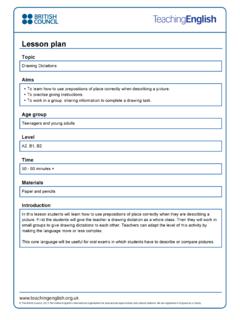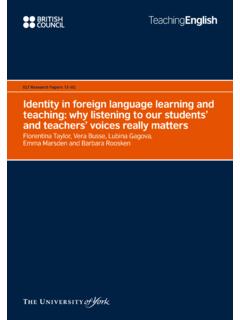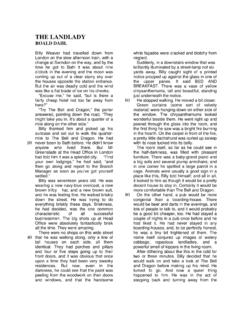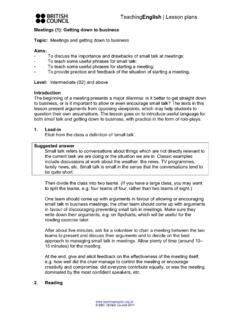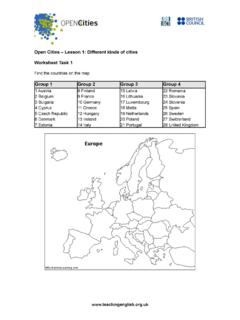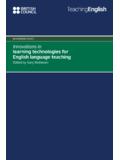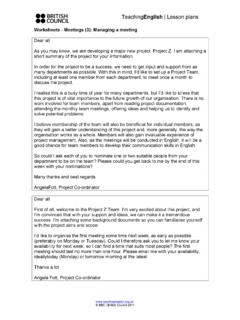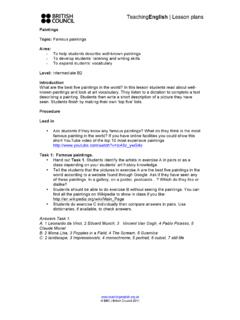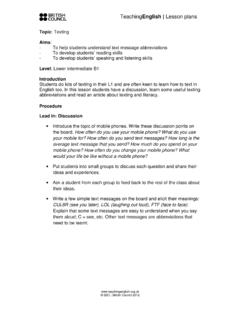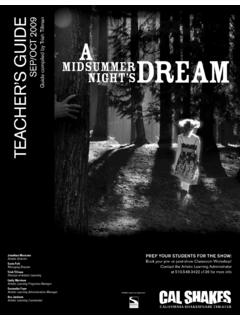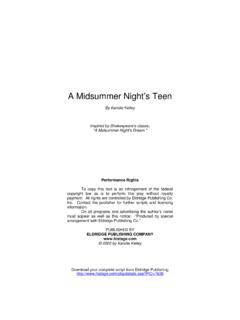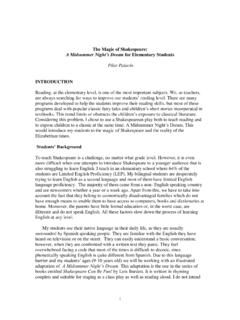Transcription of A Midsummer Night’s Dream - teachingenglish.org.uk
1 A Midsummer Night s Dream Topic The Shakespeare play A Midsummer Night s Dream , ideas from the play, dreams and magic Aims Learners will develop strategies for watching and understanding a short video based on the Shakespeare play A Midsummer Night s Dream . Learners will develop comprehension and speaking skills by discussing ideas from the play. Learners will develop writing skills through a personalised writing activity based on an element from the play. Age Older primary (9 11 years) Time 1 x 45-minute lesson or three shorter segments Materials A Midsummer Night s Dream video, worksheet, answers, transcript, character flashcards and games: Introduction In this lesson plan, which can be delivered as a 45-minute lesson or as shorter segments over three lessons, learners will be introduced to the Shakespeare play A Midsummer Night s Dream through a short animated video.
2 They will complete comprehension activities and then think about and discuss the ideas of dreams and magic from the play, with the teacher s guidance. Finally learners will develop their creative writing skills by imagining and writing about either a magical Dream or a magic potion or spell. Procedure 1. Introduce and watch the video (15 mins) Ask your learners if they usually remember their dreams or not. Have they ever had a really amazing Dream ? Tell the learners that they are going to watch a video called A Midsummer Night s Dream , but we don t know if it s really about a Dream or not. Give learners the video worksheet and ask them to match the words and pictures (exercise 1). Check answers as a class.
3 Ask learners to make some predictions about the video based on the words. Play the video and ask learners to match the characters and their names as they watch (exercise 2). Ask them to compare in pairs and then check as a class. Now ask learners to try to order the sentences (exercise 3). Tell them it doesn t matter if they can t remember, because they will watch the video again. Play the video again and learners check their answers to exercise 3. Ask them to compare in pairs, then go through as a class. At this stage, you might like to ask learners additional questions to help clarify their understanding, or ask them to say which of their earlier predictions were correct. Alternatively, play the video again and ask learners to circle true or false (exercise 4) as they watch.
4 Fast finishers can try to correct the false sentences. Ask learners if they liked the story and why. Did they think it was funny, interesting, happy/sad, If your learners need more support understanding the video, you might like to adapt the transcript of the video and get learners to act it out. 2. Discuss ideas from the play (5 10 mins) Two of the ideas in A Midsummer Night s Dream are dreams and magic . The depth to which you discuss the ideas and questions in this stage will depend on your learners age and maturity, and you may need to provide more or less support. Ask your learners if they think the ending was a happy ending, and why. Elicit because they were all in love with the right person at the end Hermia and Lysander love each other, and Helena and Demetrius love each other.
5 But what was the situation at the beginning of the play? Elicit that Hermia and Lysander loved each other, and Helena loved Demetrius, but Demetrius didn t love Helena. Now ask your learners why Demetrius loves Helena at the end of the play. Elicit that it is because Oberon uses the magic flower to make him fall in love with her. Do your learners think it was a Dream or did it really happen? If it was a Dream , how come Demetrius loves Helena when they wake up? 3. Extension (20 30 mins) In the play, a magic flower is used to make people fall in love with each other. Ask your learners if they know any other stories where the characters have used magic. How did they make the magic? For example, was it a magic potion or a magic spell?
6 Ask learners to imagine they could go to sleep tonight and Dream about something magical happening. What would they like to Dream about? Would they like it to be true when they wake up or only a Dream ? Brainstorm some ideas on the board, then learners can write about their Dream , illustrate it or storyboard it. Alternatively, ask learners to invent their own magic potion or spell! Brainstorm on the board ideas for what magic the potion or spell will do. Encourage both horrible potions and nice potions, for example it will turn you into a frog or it will make you good at homework! Brainstorm ideas for the recipe, then learners can write about their potion or spell and illustrate it. You could put all the dreams or potions/spells up around the class, and learners can say whether they would like to have this Dream or try the potion/spell, or not.
7 4. Further activities Would you like to extend your learners work with A Midsummer Night s Dream ? Try one of our suggested further activities here: Contributed by Rachael Ro
